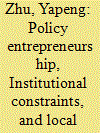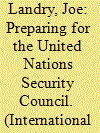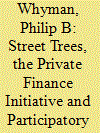| Srl | Item |
| 1 |
ID:
124289


|
|
|
|
|
| Publication |
2013.
|
| Summary/Abstract |
Policy entrepreneurship has been a key concept to explain policy dynamics and policy changes. Despite considerable debate on the role of policy entrepreneurs in the policy making process, insufficient effort has been put forth on motivations of policy entrepreneurs and interactions between policy entrepreneurs and other key players in different settings. This article explores the role of policy entrepreneurship in local policy process in a transitional society, China, with special reference to housing reform experience in Guizhou Province. It argues that value, knowledge, and tactics such as framing are crucial for policy
|
|
|
|
|
|
|
|
|
|
|
|
|
|
|
|
| 2 |
ID:
189885


|
|
|
|
|
| Summary/Abstract |
In the run up to Canada’s bid for a seat on the United Nations Security Council (UNSC), Global Affairs Canada undertook thorough policy preparations to prepare for a potential term. Notwithstanding the unsuccessful vote on Canada’s candidacy, sharing our approach to policy design is worthwhile so that current and future policymakers can replicate these efforts and learn lessons from our experience. Indeed, transparency and openness are critical to the functioning of liberal, democratic institutions; seeing “how the sausage is made” can improve public perceptions of government accountability, which is critical in a time of waning trust in institutions. Given the wide breadth of issues that UNSC member states must be ready to engage on, the team designed a cross-cutting approach to policy development which ensured that stakeholders were able to provide valuable input to help shape Canadian positions. This process involved the crafting of “signature initiatives” and position papers to advance Canadian priorities in a structured and effective manner over the course of the potential UNSC term.
|
|
|
|
|
|
|
|
|
|
|
|
|
|
|
|
| 3 |
ID:
172410


|
|
|
|
|
| Summary/Abstract |
In common with other northern cities, Sheffield has experienced a dramatic reduction in funding from central government. Its response has been twofold. Firstly, to reduce the cost of service delivery, in part through augmenting or replacing public sector service provision through transfer to voluntary bodies and/or the private sector; the latter through private finance initiative (PFI) contracts. Secondly, the local authority has sought to promote economic regeneration through increased citizen involvement and participation. The problem for this combined strategy is that the two approaches have clashed over a previously underrated and overlooked area of public provision, namely the maintenance of street trees. Issues relating to the design of the contract, the economic imperative inherent within PFI contracts, initial reaction to popular protests, and reluctance to acknowledge the authority of alternative perspectives, have combined to undermine the salience of the participatory regeneration model for key sections of the local community.
|
|
|
|
|
|
|
|
|
|
|
|
|
|
|
|